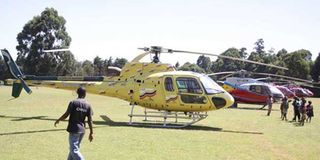Expensive campaigns would shock founding politicians

Choppers parked at Eldoret Sports Club before a campaign rally. A helicopter has become the status symbol in today’s politics. PHOTO | FILE | NATION MEDIA GROUP
What you need to know:
- Mzee Jomo Kenyatta, who ruled for 15 years, hardly faced any credible electoral challenge.
- On paper, Mr Kenyatta’s TNA party, which has since been dissolved to form Jubilee, indicated a sum of Sh345.5 million as its income for the election year.
- Sh244.6 million was the amount indicated by Mr Odinga’s Orange Democratic Movement.
- Dubbed “one-million-a-plate-lunch”, the Mwai Kibaki campaign in 2007 easily raised Sh100 million during a luncheon at Safari Park Hotel, Nairobi.
If he were to rise from the dead today, founding President Jomo Kenyatta would be shocked at the gruelling campaigns and huge sums of money his son and other candidates are spending in the race for State House.
Mzee, who ruled for 15 years, hardly faced any credible electoral challenge.
Even his successor Daniel arap Moi, who was in charge of the country for 24 years, faced off with a fractured opposition only twice in 1992 and 1997 under election regulations that were clearly in his favour.
Until the reintroduction of multi-party politics in 1992, Kenyan presidents were “re-elected” unopposed.
MERE FORMALITY
Then, the “election” was a mere formality presided over at Nairobi’s Uhuru Park, where the incumbent gathered with Kanu party officials and his supporters to present nomination papers to the elections supervisor.
And at midday, with obviously no other aspirant in sight, the president would be declared re-elected – without spending a penny!
That is no longer the case as candidates are spending millions of shillings daily on campaigns.
In the 2013 presidential election, for instance – when Mr Uhuru Kenyatta and Mr Raila Odinga were frontrunners as they are now – some estimates put the amount spent in campaigns at Sh20 billion.
SH345 MILLION
On paper, though, Mr Kenyatta’s The National Alliance party, which has since been dissolved to form Jubilee, indicated a sum of Sh345.5 million as its income for the election year.
Meanwhile, Sh244.6 million was the amount indicated by Mr Odinga’s Orange Democratic Movement.
The outfits loosely list their sources of income as “friends of the party” and “well-wishers”.
Other sources include monthly contributions from elected leaders as well as nomination fees collected from aspirants for various seats.
INCREASED DEMAND
But owing to the increased demand to meet rising campaign costs, parties have over the years devised other avenues of raising money, including accepting donations from suspicious sources.
Ford Kenya leader Jaramogi Oginga Odinga was one such party leader, when he admitted in 1993 to receiving some “small cheque from a young man who said he wanted to help our campaigns”.
When the identity of the “young man” was finally revealed, the Ford-K leader was terribly embarrassed after he turned out to be Kamlesh Pattni, the disgraced businessman and architect of the Goldenberg mega-scandal.
He had “donated” Sh2 million to Ford Kenya.
POLITICAL CAREER
Mr Pattni also said he had given deputy party leader Paul Muite Sh20 million – damaging the respected lawyer’s reputation and political career.
Years later, former Justice and Constitutional Affairs Minister Martha Karua found herself in a similar situation.
British newspaper The Independent said representatives of the Narc-Kenya party leader had received a £50,000 (Sh7.6 million) “donation” from British American Tobacco while she campaigned for the presidency in 2013.
A BBC investigation also claimed then Trade minister Moses Wetang’ula was offered a business class ticket to London.
VOLUNTEERED SUPPORT
Ms Karua denied being involved in any wrongdoing, but conceded that Narc-K received the cash.
She said many corporate institutions volunteered to support her campaign “with clearly no strings attached”.
On a more positive note, parties have in the last 15 years devised “better” ways of raising campaign money.
Dubbed “one-million-a-plate-lunch”, the Mwai Kibaki campaign in 2007 easily raised Sh100 million during a luncheon at Safari Park Hotel, Nairobi.
This has been replicated by Mr Odinga, twice in 2013, Wiper Party boss Kalonzo Musyoka as well as Deputy President William Ruto, then leader of United Republican Party in 2012.




